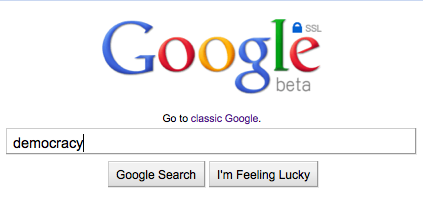Democracy: A Googley Sort of Value?

Jared Cohen, the new director of Google Ideas, stopped by NDI this week. He's been something of a perpetual motion machine of late, zipping around the country and world, collecting thoughts and inspiration from experts in a variety of issue areas.
Google Ideas, as described by Jared, is a project to match Google's technological expertise with 'subject matter experts' to address major global challenges. In jargon terms, silo-busting.
Now, regular readers of this blog should know how we feel about technology as a solution. Google Ideas doesn't seem to believe in it either - but it is determined to reconsider these seemingly-intractable problems by recognizing technology as an aspect of every situation, and leveraging its formidable resources towards any emergent solutions.
But wait, what does Google have to do with democracy?
- Google's mission statement is to organize the world's information.
- Democracy thrives when information is available and flows freely.
As a company, Google is aware that its tools have applied value to democratic processes - but along a spectrum of declining return. The more open a society, the greater the accrued benefit, and the more closed a society, the more diminished the relevance. It's tautological - tools for organizing information need information to organize.
In closed societies, information is a highly constrained and therefore valuable resource: when information is not free, it is necessarily measured - commoditized. Measurement (of any commodity) assigns the commodity a value separate from its intrinsic value. In closed societies, the accumulation of information is a measure of power.
However, when information is free, or ubiquitous and infinite, measured value has no practical meaning; the value of any piece of information is purely intrinsic. In free information environment, evaluating the intrinsic worth of an infinite supply of information requires extraordinarily powerful tools.
These are precisely the sort of tools that Google builds, and the reason why these tools can be of limited utility in democratization in closed societies.
Jared was at NDI to think through 'scene-setting' for the challenges to democracy around the world. What sorts of environments exist? Closed societies aren't necessarily a product of pure malign repression - sometimes they trend that way because of factors such as lack of institutional capacity, or inadequate infrastructure or resources. Information like this will inform Google Ideas' approaches to problem solving.
For democracy and democratization, one of Google Ideas' challenges will be to apply the company's core competence - organizing information - to the absence or the suppression of information.
This isn't a trivial challenge, but it is a welcome effort. Democratic development can be challenging, delicate work, and the more tools that citizens and practitioners have their disposal, the better - particularly if those tools are reliable, secure, localized, widely accessible, and designed for specific problems, environments, or locations.
When Google gets the problem statement right, its tools can be all of those things - we hope that NDI's contribution will be to use our experience and country presence to help Google Ideas define those problems.
